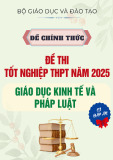
UBND TỈNH TIỀN GIANG KỲ THI LẬP ĐỘI TUYỂN HỌC SINH GIỎI QUỐC GIA
SỞ GIÁO DỤC & ĐÀO TẠO LỚP 12 THPT NĂM 2011
Môn thi : TIẾNG ANH
Thời gian thi : 180 phút ( không kể thời gian giao đề )
Ngày thi : 23/11/2011
Đề thi có 15 trang , gồm 04 phần ( I, II, III và IV )
Thí sinh không được sử dụng tài liệu, kể cả từ điển.
Giám thị không giải thích gì thêm.
Thí sinh làm bài trực tiếp lên đề thi ( ở những chổ dành sẵn )
Chữ ký Giám khảo I : Chữ ký Giám khảo II :
Điểm từng câu
Câu 1 ……………….
Câu 2 ……………….
Câu 3 ……………….
Câu 4 ……………….
Câu 5……………….
Câu 6……………….
Câu 7……………….
Câu 8……………….
Câu 9………………
Câu 10…………
Tổng điểm ( số )
------------------------------------------------------------------------------------------------------------------
I. LISTENING ( 4/20 points).
Bài nghe gồm 3 phần, mỗi phần được nghe 2 lần, mỗi lần cách nhau 15 giây, mở đầu và
kết thúc mỗi phần nghe có tín hiệu
Mở đầu và kết thúc bài nghe có tín hiệu nhạc. Thí sinh có 3 phút để hoàn chỉnh bài trước
tín hiệu nhạc kết thúc bài nghe.
Mọi hướng dẫn cho thí sinh ( bằng tiếng Anh) đã có trong bài nghe.
Part 1: Questions 1 – 10
This is an introductory talk by a Student Information Officer. Listen and answer the
following questions by either choosing the correct answers or supplying your own
answers in the space provided. ( You do not need to write full sentences.)
1. Overseas students will enroll on
Đề chính thức
SỒ PHÁCH
SỒ PHÁCH

A. 8th February
B. 16th February
C. 17th February
D. 18th February
2. Undergraduate students must enroll
A. between 8.00 and 10.30 am
B. between 9.30 am and 12.30 pm
C. between 12.30 and 2.30 pm
D. between 2.00 and 4.30 pm
3. The venue for enrolment is
A. in the Mathematics Faculty
B. on Level 158
C. in Room C658
D. in Room C6
4. At enrolment, all students
A. must show a letter of acceptance from their faculty
B. need not show their letter of acceptance
C. need not bring any identification
D. must prove their level of English proficiency
5. Students who have paid their fees
A. should go to the International Students’ Office
B. are guaranteed a place at university
C. must get a bank cheque
D. should pay a further $ 10,000
6. The student Card
A. is issued before enrolment
B. has the student’s identification number
C. is issued by the Library
D. is not laminated
7. During university term, the Library will be open
A. from 9.00 am to 4.00 pm
B. from 9.00 am to 9.00 pm
C. from 8.30 am to 9.00 pm
D. from 4.00 pm to 9.30 pm
8. If anyone who hasn’t paid their fees for this semester yet, where should they go?
__________________________________________________________________
9. As regards paying the fees, what is a word of advice?
________________________________________________________ .
10. Why don’t you have to bring a photo for Student Cards?
Because the enrolling officer will _______________________ and put it on the card, so it’s all
done at once.
Part 2 : Questions 11 – 25
Listen to a newsreader talk about a disaster and fill in the missing information in the numbered
space.
Severe storms hit the western areas of the city last night, leaving (11) ____________________
of destruction and at least a hundred homes without power or running water.
Dozens of families were left homeless when the roofs of their houses (12) were
_____________________ away.
Many of the areas hit were the same ones badly affected by (13) _____________________
last week.
In Macquarie Street, the council car park was completely (14) _____________________ .

A Toyota Corolla was badly damaged by floodwaters which carried the car across the (15)
_____________________ and into a large stormwater drain.
A separate storm (16) _____________________ through the Federation Botanical Park.
It uprooted at least (17) _____________________ ; many of them were over a hundred years
old.
In Menal, several trees were found lying on parked cars, causing an insurance bill that will run
into the (18) _____________________ of dollars.
Winds were recorded at speeds of over (19) _____________________ kilometers an hour.
People were trapped in cars for up to an hour because the (20) _____________________ had
left them stranded in swollen creeks, amidst a sea of debris.
There were (21) _____________________ of cars being piled one on top of the other.
In Lucas Heights a tree fell on a mini-bus that was taking the (22) _____________________
soccer team to training. Luckily all but the driver escaped serious injury.
The (23) _____________________ is in an (24) _____________________ condition in
Westmead Hospital.
For tomorrow, weather reports predict improved conditions, with clear skies and an expected
(25) _____________________ temperature in the city of 14, Helen Brookes reporting for
ILTC RADIO NEWS.
Part 3: Questions 26 - 40
You will hear a conversation between a representative of an insurance company and a person
who wishes to apply for life insurance. While you listen to the conversation, complete the
person’s application form by either circle the choice or by supplying the information.
Swallow Life Insurance
Name of Applicant
(26) ………………………..
Address (27)
………………………..
………………………..
………………………..
Postcode (28)
………………………..
Age (29)
………………………..
Height (30)
………………………..
Weight (31)
………………………..
Marital Status (32)
………………………..
Single
Married
Divorced
Widowed
MEDICAL HISTORY
Serious illness
(33) ………………………..

Which of the following
is not described as
serious illness by the
interviewer?
measles, kidney disorder, pneumonia, cancerous
growth
(34) ………………………..
Major surgical
operations
(35 ………………………..
Any current medical
condition
(36) ………………………..
Is applicant’s father or
mother dead ?
Father Mother
(37) ………………………..
If so, at what age did
he/she die? Why?
Age: (38)
………………………..
Cause of Death: (39)
………………………..
Is the applicant
currently a smoker?
Yes No
(40) ………………………..
II. LEXICO - GRAMMAR ( 6/20 pts.)
Part 1 : Choose the word or phrase that best completes each sentence. Write your answer
( A, B, C, or D ) in the numbered box.
41. In the last century, it was widely …………… that Indian fakirs were capable of
superhuman feasts.
A. held B. grasped C. kept D. shaken
42. We may win, we may lose – it’s just the …………… of the draw!
A. strike B. odds C. chance D. luck
43. Claims for compensation could …………… run into billions of pounds.
A. far B. much C. well D. most
44. Trespassers will be …………… .
A. perpetrated B. persecuted C. proscribed D. prosecuted
45. A traveler looks down on anyone who seems to be a(n) ……………tourist
A. only B. sole C. mere D. lone
46. We welcome the new regulations, which become .…………… on the first of next month.
A. effective B. efficient C. efficacious D. effete
47. He’ll never be able to come .…………… with his failure to win the tournament.
A. down B. round C. to terms D. up
48. He’s on his own now – he’ll have to ………… his own canoe!
A. row B. steer C. paddle D. ride
49. Most people buy their houses with a loan which they then pay back ………… 25 years.
A. over B. during C. with D. throughout
50. People who are squeamish are afraid of the ………… of blood.
A. spectacle B. view C. sight D. look

Your answers
41. 46.
42. 47.
43. 48.
44. 49.
45. 50.
Part 2: Write the correct FORM of each bracketed word in the numbered space provided
in the column on the right. ( 0) has been done as an example.
Your answers
There is (0) _________ (WIDTH) cross-cultural variation in the
social rules governing the selection of a partner for marriage. There is
variation in the degree to which (51) _________ (PART) selection is an
individual decision by the partners or a collective decision by the partners
kin groups, and there is variation in the rules (52) _________
(REGULATIONS) which partners are valid (53) _________ (CHOOSE) .
In many societies the choice of partner is limited to suitable persons from
specific social groups. In some societies the rule is that a partner is
selected from an individual's own social group - endogamy, this is the case
in many class and caste based societies. But in other societies a partner
must be chosen from a different group than one's own - exogamy, this is
the case in many societies practicing totemic religion where society is (54)
_________ (DIVISION) into several exogamous totemic clans, such as
most aboriginal Australian societies. In other societies a person is
expected to marry their cross-cousin, a woman must marry her father's
sister's son and a man must marry his mother's brother's daughter - this is
often the case if either a society has a rule of tracing kinship (55)
_________ (EXCLUSION) through patrilineal or matrilineal descent
groups as among the Akan people of Africa. Another kind of marriage
selection is the levirate marriage in which widows are obligated to marry
their husband's brother, this is mostly found in societies where kinship is
based on endogamous clan groups.
In other cultures with less strict rules governing the groups from
which a partner can be chosen the selection of a marriage partner may
involve either the couple going through a selection process of (56)
_________ (COURT) or the marriage may be arranged by the couple's
parents or an outside party, a matchmaker.
A pragmatic (or 'arranged') marriage is made easier by formal
procedures of family or group politics. A responsible authority sets up or
(57) _________ (COURAGE) the marriage; they may, indeed, engage a
professional matchmaker to find a suitable spouse for an (58) _________
(MARRY) person. The authority figure could be parents, family, a
religious official, or a group consensus. In some cases, the authority figure
may choose a match for purposes other than marital (59) _________
0. wide
51. _________
52. _________
53. _________
54. _________
55. _________
56. _________
57. _________
58. _________
59. _________












![Đề thi tiếng Anh tốt nghiệp THPT 2025 (Chính thức) kèm đáp án [mới nhất]](https://cdn.tailieu.vn/images/document/thumbnail/2025/20250627/laphong0906/135x160/9121751018473.jpg)



